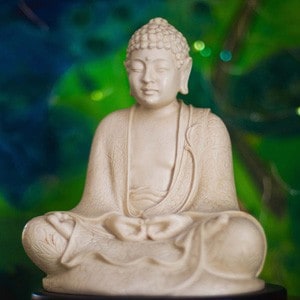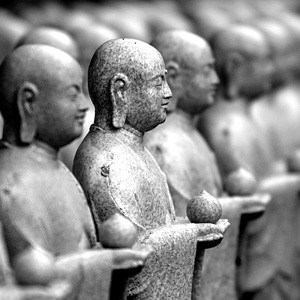How the bodhisattva vows are useful
Part of a series of teachings based on the The Gradual Path to Enlightenment (Lamrim) given at Dharma Friendship Foundation in Seattle, Washington, from 1991-1994.
LR 079: Bodhisattva vows 01 (download)
Whether or not you’ve taken the bodhisattva vows, it’s very helpful to know the teachings. They provide very good guidelines for how to live our life. If you have taken the bodhisattva vows, then it’s very important that you take the teachings, otherwise it will be difficult to keep them. If we don’t keep them, we’re defeating our whole purpose of taking them. If you have taken any tantric empowerment—not the jenang, but the actual empowerment where you enter the mandala—then you do have the bodhisattva vows, and therefore it is important to know them.
Often in the West, people want the empowerment but they don’t want the vows. [laughter] That happens because people often don’t understand the purpose of the empowerment or the purpose of the vows. A tantric empowerment isn’t just a blessing. We take a tantric empowerment so that we can do the related practice. What helps us do the practice and make our mind receptive to the practice is abandoning certain harmful actions and putting our mind into doing certain constructive actions. If we’re truly intent on this process of self-improvement and becoming Buddhas, then the vows or the precepts aren’t burdens. They are ornaments. They’re things that we value and treasure. They help make our life very clear.
You can see that for yourself. If we look in our life, there are times when we were confused, “I don’t know what to do. Is this good? Is this not good? I can’t tell if I have a good motivation or bad motivation. I don’t know what I’m doing in my life anyway!” Often we feel that way. We can live years and years with that kind of confusion in our minds, even lifetimes. When you know these guidelines well, it serves as a tool to help us clarify many things in our life. It helps us develop an acute sense of intelligence that can discriminate what to practice and what to abandon, what’s a positive action and what’s a negative one, what’s a good motivation and what’s an incorrect motivation. We need to spend some time hearing the teachings about these guidelines, reflecting on them and applying them to our life to better know ourselves.
Otherwise we have the common American thing of, “I’m so out of touch with myself. I don’t know who I am.” That’s basically because we don’t spend enough time alone with ourselves, to make friends with ourselves. Spend time learning these guidelines and then use them as a way to get to know ourselves.
Some people, when they hear the word “vow,” like when you say “bodhisattva vow,” they just get completely tight. I think that comes very much from our Christian upbringing where we associate vows with repressed passion, punishment and guilt. We have to snitch behind the vow and what happens if we get caught? And God knows anyway, so then you really screwed. [laughter] When we hear the word “vow,” all these other ideas often come into the mind. It’s interesting.
When that happens, it’s very good to use it as an opportunity to learn about ourselves. When all the preconceptions come in the mind, notice, “Oh! This is a preconception and it is not helpful to think this way. This is not what the Buddha taught.” Then it becomes useful. We get to see a lot of our past conditioning, how we react to certain words and certain concepts. We get to see how the religion we grew up with affected us. It may also affect us in other ways in our life which we are totally unaware of. If we take these opportunities to look at what is going on instead of getting tight and running away, we can grow a lot.
In Buddhism, a vow or a precept is something that liberates you. It’s not something that tells you what you can’t do. It’s something that tells you what you don’t have to do anymore. It is based on the idea that in us, there is a pure motivation that doesn’t want to screw around anymore, that wants to get our life together and make our life meaningful, that doesn’t want to get into one jam after another or one dysfunctional relationship after another. If we can touch base with that part of us, then we can see how taking a vow or a precept is a relief. It’s like, “Oh, I don’t have to get involved in that kind of behavior anymore even if there are tons of peer pressure, even if everybody else is going, ‘How come you’re not doing that anymore?’ I know in my own heart of hearts that I don’t want to. The vow is really what protects me and what liberates me.”
A vow isn’t telling what you can’t do anymore and thinking, “Oh boy! I have to give up all that fun stuff!” Rather, it’s touching base with that purity of the motivation that we do have. This is important to remember. Don’t see vows as imprisoning, but as liberating.
They do liberate, because they make us look at ourselves. We all come to the Dharma because somehow we want to change. We want to get to know ourselves. But then as soon as Dharma makes us look at ourselves, we say, “Sorry, I’m real busy on Monday and Wednesday nights [when Dharma classes are held].” [laughter] We get real stuck in this. Our mind is like, “Oh I want to change and I want to get to know myself, but don’t ask me to change. I really can’t do that.” We get stuck in this strange mental space sometimes. It’s interesting to watch. We don’t have to take it too seriously. It’s quite amusing to watch the ego coming up with all this variety of things to keep us from getting down to business. Or ego will make a fuss about something else. We have lots of creative potential, untapped. [laughter]
Venerable Thubten Chodron
Venerable Chodron emphasizes the practical application of Buddha’s teachings in our daily lives and is especially skilled at explaining them in ways easily understood and practiced by Westerners. She is well known for her warm, humorous, and lucid teachings. She was ordained as a Buddhist nun in 1977 by Kyabje Ling Rinpoche in Dharamsala, India, and in 1986 she received bhikshuni (full) ordination in Taiwan. Read her full bio.


